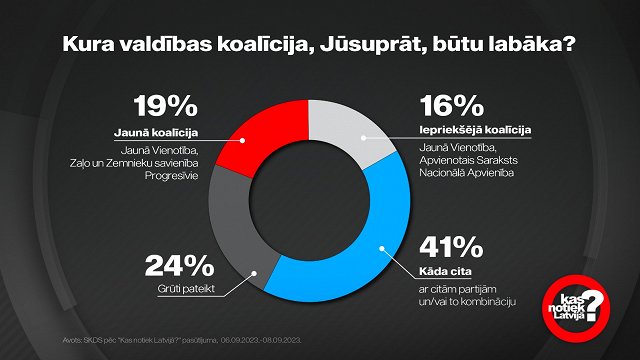Representatives of the United List met with Siliņa and other New Unity representatives at the Saeima (parliament) with the United List subsequently revealing the substance of the meeting, reported Latvian Radio.
However, later in the day United List declined to participate in the proposed government model that would see the National Alliance – which is in the current coalition – excluded. Instead, the United List will suggest its own coalition model on Wednesday, in which the candidate for the position of prime minister will still be Evika Siliņa.
Edgars Tavars, head of the United List Saeima faction, said after the joint meeting of the board and the faction:
"The model proposed by Silina is not the most effective. We have our own, which we will inform the President and the prime minister candidate about tomorrow."
Earlier, Tavars had said that in the conversation held on Tuesday, he and his colleagues heard an offer to join a nascent coalition formed by New Unity, ZZS and the Progressives. Without the United List, such a government would have a very small majority in parliament with 52 out of 100 votes. However, with the United List's 15 deputies on board as well, a much healthier 67 seats would come under coalition control.
The inclusion of ZZS in the coalition model is not without controversy given that it is closely associated with ex-mayor of Ventspils, Aivars Lembergs, who is subject to U.S. sanctions and has recently been spending time behind bars after being convicted of various graft-related charges.
Indeed, several of the United List's most well-known politicians were formerly in the ranks of ZZS but quit the party to join a new political force precisely because they were tired of association with Lembergs.
For her part, Siliņa has repeatedly emphasized that the influence of persons subject to U.S. sanctions associated with ZZS – meaning Lembergs – will not be allowed to influence the work of government. Regardless, the efforts of first Krišjānis Kariņš and now Siliņa to bring ZZS back into government could be argued to have had the effect of rehabilitating ZZS' reputation and undermining New Unity's previous claims that they would not have anything to do with oligarch-influenced parties.





























